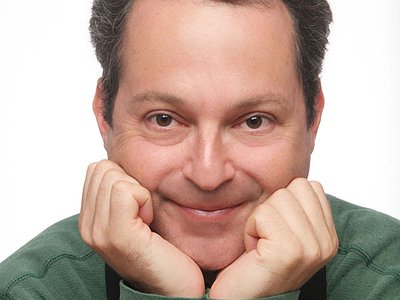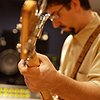Learning to swim in the delta
Pianist and music critic Charles Rosen once quipped that "the death of classical music is perhaps its oldest continuing tradition". Indeed, despite being repeatedly declared dead over the past sixty years, the great Western music tradition has held its chin up high, still being performed, recorded, enjoyed, attacked and vividly discussed all over the world. At the same time, one can't help but feel that with orchestral budgets tightening, album sales plummeting and audiences seemingly growing older and smaller with each year, the relevance of contemporary composition is eroding. In our first 15 Questions Round Table, we spoke to four insiders to find out about their perspective on the situation: Composers Dobrinka Tabakova and Nimrod Boreinstein, New Amsterdam label manager Michael Hammond (who's also a composer and sound artist himself) as well as PARMA Recordings CEO and Dreadnaught-bassist Bob Lord. Their perspective on the scene is certainly never uncritical - and yet, with all of their personal differences, it is anything but pessimistic either. If their predictions are correct, Rosen's tradition may yet continue for many inspiring years to come.
In many respects, there was an incision in the Western musical tradition after the serialist and aleatory experiments, with the scene seemingly splintering into myriads of niches and sub-styles. From your perspective, what have been the most significant consequences of these changes for composers? Do you, like John Cage, believe we may have "left the river and come to a delta" or are we merely going through a confusing transitional phase?
Nimrod Borenstein / It may seem as though everything in life is moving faster, but I don't think that's true. If you look at past periods, how you go from Bach to Mozart in just a few years and then on to Beethoven, Schuman and Wagner, you have completely different concepts within merely thirty years. At the beginning of the 20th century, there were three new directions, which is a lot. First, there was Schoenberg who offered twelve-tone-music. And then there's the Stravinsky-model, which is another type of modernity. Finally, the third way would be the rest – a less aggressive approach to it. And from there on, we stalled. Within the past seventy years, we've worked with the same ideas. Which is a very long time to be static in terms of the history of art.
The historical period that followed the Second World War was highly ideological, both in the political and artistic world. We now live in a postmodern, “relativist” time that has lead to less homogeneity, a time that may seem like a transitional stage full of confusion. Cage may have been right in believing that we have “left the river and come to a delta" but with time, each literary or artistic revolution branches out. This is better this way as when the path has been opened each artist will find his own road matching his research and interests. In our complex and pluralistic world it would be unthinkable (and sad) to have total uniformity in art. My impression is that more time needs to pass for us to be able to have a real historical perspective on our own time.
Dobrinka Tabakova / The increasing number of tributaries joining the river is ever expanding, but so is our ability to access them. The availability of all these musics is what is particularly exciting and could shape the flow of things, I think. After the delta comes the sea or ocean and we have to learn to swim there too.
Bob Lord / I think Cage was spot-on in his assessment. There’s no going back – we can’t revert to previous points in time where the musical vocabulary was more limited. As creators I believe we are all to some degree seeking the best, most effective, most comprehensive way to express our thoughts, and the continuing advancement of musical languages, artistic hybrids, and modes of delivery is only a good thing to my mind. Think about the advancement of scientific thought and theories – nobody (well, almost nobody) is saying "Let’s go back to Pre-Copernican thought, it was so much more enjoyable than quantum physics," but yet the analogous comment is made about modern music every minute of every day all over the world. And for the record, I absolutely delight in "confusing transitional phases" – those are often some of the most engaging compositions and creations, and frequently present a fascinating point of entry into a composer’s process.
Dobrinka Tabakova / In my opinion, this has more to do with the technology which we have, rather than anything else. If we are to make a direct comparison with TV ratings, for example, it was usual to get tens of millions, if not more, to watch prime time programmes. There is so much more choice now, that these numbers are simply distributed among different networks and mediums.
Michael Hammond / I do believe somewhat in the idea of the monoculture that's been squashed and splintered into a million pieces. However, I think to the extent that that narrative is true, it is is also part of a much larger, cyclical process. Culture is always tearing itself down and reinventing itself. Just because there's maybe no dominant strand of "contemporary composition" right now doesn't mean someone won't look back 50 years from now and use a single word to reductively encapsulate the entire scene.
I think part of it is a generational thing, too. The other day, I was reading an interview with Philip Glass that NewAm artist Jace Clayton (aka DJ /rupture) recently did for The Fader, and there's this great moment where Philip, speaking to young composers, says "don't look to the older generation; they aren't interested in you." I'm paraphrasing, but I thought that was a really honest, candid thing to say. Isn't that always the case, though? The younger generation must reinvent the wheel? But at what point does the "new" stop being perceived as fringe noise and become the dominant narrative? I'm unsure. But I'm also unsure it really matters. I'd much rather write music and let someone else worry with the teleology-constructing.









